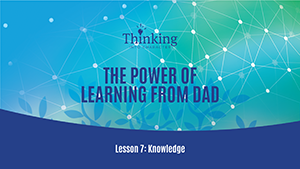Lesson 7: Knowledge
Lesson 7 – Knowledge – Part 1
There are two kinds of knowledge: general knowledge and specialist knowledge. You may have noticed that individuals having an abundance of specialist knowledge (such as doctors and engineers) earn more than those who do not. This reflects an important principle for success. General knowledge, while very important, rarely helps you to achieve great success. To succeed in particular goals, such as growing a business in your industry, it is specialist knowledge that is required.
However, specialist knowledge is not useful in and of itself. For its true value to emerge, all knowledge must be organised and intelligently directed through practical plans. This indeed is why we say that knowledge is not power. Knowledge is potential power. Knowledge becomes power when it is organised and directed towards definite goals through planning.
While it is advisable to take steps to acquire the specialist knowledge that is required to achieve the goals you desire, you must also recognise the limits of your own knowledge. About your chosen industry or business, there is so much to learn, from policy to finance to customer service. This is where we bring in the power of the mastermind.
The power of the mastermind
A mastermind is a group of individuals that you have carefully selected to work with, they are your personal team who have a different range of expertise or a wide selection of specialised knowledge distinct from your own. This is your trusted council to which you can turn to complement the gaps in your knowledge.
Make sure your mastermind is a trusted group of individuals, with positive mental attitudes and a wide range of expertise, particularly in areas outside your special area of interest. By interacting with and brainstorming with your mastermind, not only will you learn a great deal, but you will be inspired by new ideas and new perspectives that enable you to innovate.
Indeed, the power of the mastermind shows that the knowledge utilised to achieve success does not necessarily need to be in the hands of the person utilising it to make plans – it could just as easily be derived from having the right people, and being able to lead them effectively.
Taking all of the above, into consideration, here are two questions that it is critical for you to answer:
- Do you have or are you developing specialised knowledge?
- Do you have a mastermind of experts around you?
To summarise: There are two key points to take away from this video. First, it is essential to become a lifelong learner. Learning does not end after graduation; we should always be seeking more specialised knowledge in our area of interest. Second, being a leader does not require that you are an expert in all areas relevant to your field of interest, as long as you are able to harness the skills and expertise of others, you can still succeed in your particular area of interest.
Lesson 7 – Knowledge – Part 2
In part 1, we saw that developing specialist knowledge in your area of interest and remaining a lifelong learner is essential to your success. However, too many people have the attitude that learning ends after formal schooling or that they do not have the time, and are too busy to continue studying.
Maybe you think it’s too late for you to start an entrepreneurial venture, maybe you feel that you are too busy at work, maybe you have young children or elderly parents that you look after. The truth is, it is never too late, and even with all the competing and legitimate demands on your time, a commitment to studying even 15mins a day will make a profound difference to your outcomes.
If we do not manage all of the competing demands on our time in order to pursue the specialist learning that is absolutely critical to long-term success, it will become very difficult to achieve our goals. As Napoleon Hill says:
“The person who stops studying merely because he has finished school is forever hopelessly doomed to mediocrity – Napoleon Hill
No matter what, try and commit to 15mins or more a day to work on your area of specialisation.
Where should your area of specialism lay?
In answering this question, it is important to follow your passion. Consider for example a business venture that excites you. Do you know all there is to know about the industry? Have you taken up specialist courses related to the business? Have you prepared yourself with the knowledge that you need to seize opportunities in this area?
As you gain more specialist knowledge, you will be coming up with a range of good and viable ideas, and the great thing is that, there is no fixed price for sound ideas. Thus, out of these ideas, may emerge a very profitable product or service.
As you are planning and are organising each of these ideas into practical knowledge, it is important to think of yourself, and hold yourself up to the same standards as a business. As a business you must develop new ideas for products and services, you must develop a strategic plan and clear business objectives, you must have a financial plan for the quarter and so on. What product can you create? What service can you offer? What is your strategic plan for you? And, what is your financial plan for you?
Imagine yourself as a business, so as to take charge and lead yourself as a business. Gain specialist knowledge to allow you to develop your product offer and service, learn about strategic planning and financial forecasting so you can maintain the financial health of your business. Develop your service offer, become a lifelong learner to enable you to innovate and seize opportunity and create your very own mastermind . With all of this in place, armed with your specialist knowledge you are bound to succeed.

